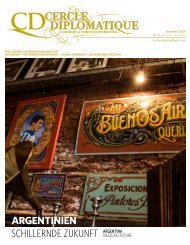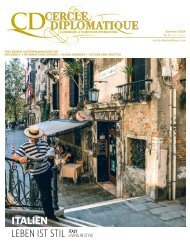IRAK DIE WIEGE DER ZIVILISATION
Create successful ePaper yourself
Turn your PDF publications into a flip-book with our unique Google optimized e-Paper software.
LE MONDE BANGLADESH<br />
Welcome to one of the most competent and comfortable private hospitals!<br />
FACTS &<br />
FIGURES<br />
RECOMMENDED BY LEADING DOCTORS<br />
Bangladesh<br />
Official name: People’s<br />
Republic of Bangladesh<br />
Location: bordered by India<br />
to the north, east and west,<br />
and the Bay of Bengal to<br />
the south and Myanmar to<br />
the south-east<br />
Area: 147,570 km2<br />
Population: 158 million<br />
Official language: Bengali<br />
Other languages: English<br />
Religion: Islam (90.4 %),<br />
Hinduism (8.2 %),<br />
Buddhism, Christianity<br />
Capital city: Dhaka<br />
Currency: Taka<br />
Climate: tropical with mild<br />
winters from October to<br />
March and hot, humid<br />
summers from March to<br />
June<br />
Public holiday: 26th<br />
March, Independence and<br />
National Day<br />
Form of state:<br />
People‘s Republic<br />
Head of State:<br />
Abdul Hamid<br />
Head of Government:<br />
Sheikh Hasina<br />
From left to right: Honorary Consul Wolfgang Weninger,<br />
First Secretary Shabab Bin Ahmed, Ambassador Mohammed Abu<br />
Zafar, Salma A. Zafar, Honorary Consul Ernst W. Graft.<br />
global identity and stature as a responsible and contributing<br />
member of the international community.<br />
Inspired by the Father of the Nation Bangabandhu<br />
Sheikh Mujibur Rahman’s vision of establishing the<br />
country as “Sonar Bangla” (Golden Bengal). The<br />
Government of Bangladesh has been tirelessly working<br />
to transform Bangladesh into a middle income<br />
country by 2021 and a developed nation by 2041. Taking<br />
into consideration the country’s geographical<br />
position, the importance of foreign development assistance<br />
and its economic and political interests.<br />
Bangladesh pursues constructive cooperation with<br />
the world of Islamic states and with western states.<br />
Relations with Bangladesh’s South Asian neighbours<br />
with whom it enjoys historic ties, geographic proximity<br />
and multifaceted cooperation is being further<br />
consolidated, while Bangladesh’s relations with its<br />
traditional economic partners in the Far Eastern region,<br />
especially China, Japan and South Korea have<br />
been vibrant. Both China and Japan are supporting<br />
Bangladesh in expanding infrastructure. The country<br />
also enjoys particularly close relations with states<br />
in the Gulf, where more than half of Bangladesh’s<br />
overseas workers are employed. Second only to export<br />
revenues from the textile industry, their remittances<br />
to home are Bangladesh’s most important<br />
source of income. Bangladesh is a founder member<br />
of the South Asian Association for Regional Cooperation<br />
(SAARC), the Group of Eight Developing<br />
Countries (D-8) and the Bay of Bengal Initiative for<br />
“Multi-Sectoral Technical and Economic Cooperation”<br />
(BIMSTEC). The country is a member of the<br />
United Nations, the Commonwealth of Nations, the<br />
Organisation of Islamic Cooperation and the Movement<br />
of Non-Aligned States.<br />
Bilateral relations: Austria – Bangladesh<br />
The foundations for the good relations between<br />
Austria and Bangladesh were laid back in 1971 when<br />
Austria supported Bangladesh during its war of independence,<br />
both in a moral and a material regard.<br />
“Immediately after liberation, the Austrian Ambassador<br />
based in New Delhi basically worked out a<br />
paper on economic policy for Bangladesh, outlining<br />
how Bangladesh could deepen its economic relations<br />
with Western Europe,” Ambassador Zafar said.<br />
The First Meeting of the Austria-Bangladesh Joint<br />
Working Group was held in February 2002. From<br />
26th-28th February 2013, the Bangladeshi Foreign<br />
Minister visited Austria for the 5th Global Forum of<br />
the Alliance of Civilisation of the United Nations in<br />
Vienna. During this visit, she met a range of dignitaries<br />
including the Vice-Chancellor and Foreign Minister,<br />
Michael Spindelegger, the President of the<br />
Austrian Economic Chambers, Christoph Leitl, and<br />
members of the Foreign Policy Committee of Parliament.<br />
Both Foreign Ministers showed great interest<br />
in expanding existing economic relations further.<br />
The two saw great potential for future cooperation in<br />
fields including the energy sector, health, education,<br />
tourism and waste management. The volume of bilateral<br />
trade between the two countries in 2013 was<br />
over 360 million Euro. Around 30 Austrian companies<br />
were located in Bangladesh at the time. “There is<br />
an imbalance in trade relations between our two<br />
countries. There exist great potentials to expand our<br />
bilateral trade to 1 Billion Euro by 2020, and thereby<br />
gradually offsetting the trade imbalance. Most importantly,<br />
Austrian investment in Bangladesh in sectors<br />
like renewable energy, waste management, agro<br />
industry, pharmaceuticals, physical infrastructure<br />
and service sectors including tourism can further<br />
contribute to the healthy trade and economic relations<br />
between the two countries. One of the objects<br />
of our mission here in Austria is to work towards<br />
achieving these goals,” Ambassador Zafar stated.<br />
PHOTO: CD<br />
Top-Level Healthcare<br />
Get treatment by Vienna’s leading<br />
doctors in our excellent diagnostic<br />
and therapeutic facilities.<br />
Check-Up<br />
Choose of our variety of Check-Up-<br />
Options. For details please visit our<br />
website or contact us via:<br />
checkup@wpk.at<br />
24-Hour-Support<br />
Our clinic is your contact in need of<br />
urgent medical assistance -<br />
24 hours a day, 365 days a year.<br />
WIENER PRIVATKLINIK<br />
A-1090 Wien, Pelikangasse 15<br />
T: +43 1 40 180 - 0<br />
info@wpk.at<br />
www.wpk.at<br />
since 1882<br />
Get your personal EMERGENCY CARD<br />
64 Cercle Diplomatique 1/2015<br />
If you are conveyed by the emergency ambulance, make sure to tell the emergency staff that you want directly<br />
be taken to the Wiener Privatklinik.

















